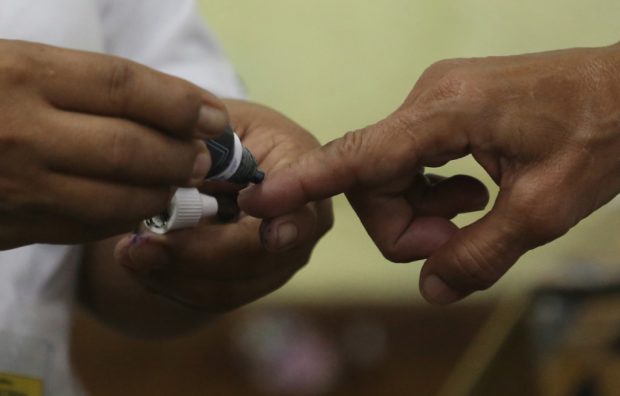Duterte: Point to me someone who doesn’t buy votes

Credit to Author: besguerra| Date: Mon, 13 May 2019 23:24:44 +0000
MANILA, Philippines — Vote-buying will be part of Philippine elections as long as the country remains poor, President Duterte said on Monday.
“[B]uying votes has been an integral part of an election in the Philippines. There’s nobody who doesn’t buy votes. Point to me someone who doesn’t buy votes,” the President told reporters after voting in his hometown of Davao City.
He said giving money to voters should not be immediately construed as vote-buying.
“You know, when you start to give money, and I told the Commission on Elections (Comelec), that’s not because I’m buying the vote of the fellow. It’s because I’m giving him money to go to the precinct, cast his vote, and go home. Not all people have money,” the President said.
But vote-buying is illegal
“Or you send food to your leaders who are here sacrificing and waiting for food to eat so they can last until the last vote is counted,” he added.
The President acknowledged, however, that vote-buying is against the law and that those caught red-handed should face charges.
“If they are caught, they will be prosecuted to the fullest [extent] of the law,” he said.
Vote-buying, rather than violence at the polls, proved to be the biggest problem for the Philippine National Police during the election season.
Gen. Oscar Albayalde, the PNP chief, said officers had difficulty keeping up with reports of vote-buying, especially in the run-up to the vote on Monday.
“Sometimes [a report could not] be responded to immediately because our police [were] still responding to [other reports] of vote-buying, and almost half of our personnel [were] deployed to different [election] hubs,” Albayalde told reporters at Quezon City Police District headquarters on Monday morning.
Albayalde clarified that he was not talking about massive vote-buying, but about so many reports of vote-buying that swamped the police during the election period.
Not always true
“These allegations or reports of vote-buying, when you verify them, most of them aren’t true. The reports of some candidates just go too far,” he said.
“Just because you’re giving away money [doesn’t mean you’re buying votes] . . . It depends on who gives the money and to whom . . . [A candidate could give money [to supporters] for their expenses . . . A lot of people in a [candidate’s] house could just be family members,” he said.
From Jan. 13 to 1 p.m. on Monday, 302 people were arrested in 120 incidents of vote-buying across the country, mostly in Metro Manila.
One of them was Quezon City mayoral candidate Vincent “Bingbong” Crisologo, who was arrested on Sunday night in a police raid on his campaign headquarters in Barangay Bahay Toro where vote-buying was allegedly going on.
Policemen were arresting Crisologo’s supporters when he intervened, questioning the absence of a search warrant and the officers’ not being in uniform.
Crisologo’s intervention led to a scuffle and to his arrest and the filing of charges against him, including obstruction of justice, unjust vexation, disobedience and resisting arrest resulting in physical injury.
Also arrested were Crisologo’s son Edrix Crisologo, campaign manager and 43 poll watchers.
Ordered released
The city prosecutor, however, ordered their release on Monday while the case was under investigation.
According to the prosecutor’s resolution, it was unclear whether vote-buying actually happened and that there was “no showing of a clear offer to purchase a vote or accept [the offer].”
“The police accused me that I hurt them, but I’m already 71 years old. They didn’t even recover any paraphernalia that show that vote-buying took place. This is an abuse of power and abuse of authority,” Crisologo said.
“I am sure there is a compelling reason for our police to arrest [Crisologo]. There must have been something wrong. But if he sees irregularities or abuse by our police, we will gladly entertain his complaint,” Albayalde said.
Crisologo voted and remained a contender for Quezon City’s mayoralty.
James Jimenez, spokesperson for the Comelec, said Crisologo’s arrest would “not affect his candidacy in the short term.”
Obstruction of justice is not an election offense, Jimenez said, adding that the complaint against Crisologo was still under investigation.
Alleged vote-buyers arrested
At least 21 people were arrested for alleged vote-buying in Cebu, Negros Occidental and Northern Samar on Sunday and on Election Day.
A barangay captain was among those arrested in Cebu on Sunday, police said.
In Pangasinan province, a disqualification case was brought against Bugallon Mayor Jumel Espino on Monday following the arrest of his supporters, including village officials and their companions, for alleged vote-buying on Sunday.
Espino is running for the seat of Pangasinan’s second district in the House of Representatives against Provincial Board Member Raul Sison, who filed the disqualification case in the Comelec’s office in the province.
In Abra, a resolution allegedly issued by the Comelec disqualifying reelectionist Rep. Joseph Sto. Niño Bernos circulated in the province on Sunday.
The resolution, dated May 10, referred to a 2012 complaint filed against Bernos by Dolores Mayor Roberto Seares, who is running for governor against the incumbent Maria Joy Bernos, the lawmaker’s sister-in-law.
Bernos said on Monday that no such resolution had been issued by the Comelec, and assailed its circulation as “an eleventh-hour tactic to discredit” him.—Reports from Julie M. Aurelio, Jaymee T. Gamil, Mariejo S. Ramos, Tina G. Santos, Yolanda Sotelo, Karlston Lapniten, Nestle Semilla, Dale Israel, Joey Gabieta and Rachel Arnaiz
See the bigger picture with the Inquirer’s live in-depth coverage of the election here https://inq.ph/Election2019